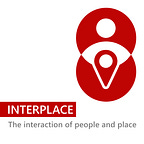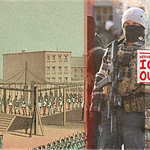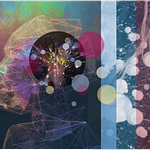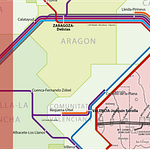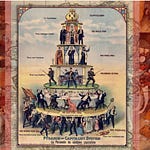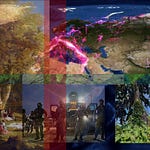Hello Interactors,
The 80s band Tears for Fears released a new album recently. Their biggest hit, Everybody Wants to Rule the World has new meaning this week. What is it about empire building sociopaths in the West and the East that makes everybody want them to stop trying to rule the world?
As interactors, you’re special individuals self-selected to be a part of an evolutionary journey. You’re also members of an attentive community so I welcome your participation.
Please leave your comments below or email me directly.
Now let’s go…
CHRONICLING THE TRUTH OF THE RUS
Rurik, a Norse Viking prince, made his way south from present day Denmark, to establish a ruling government in Novgorod in what is now Russia. He was invited by Slavik and Finn-Ugrik people to apply his governing skills to their feuding tribes.
Rurik then extended his presence further south to a city called Kiev in 850. It took another 1000 years for Kiev to be pronounced Kyiv in Ukrainian. In Russian it’s still pronounced Kiev. This outpost became the center of what became the Kievan Rus; a loose collection of Slavic, Baltic, and Finnic peoples of Eastern and Northern Europe. The city was well positioned on a visible bank on a northern edge of the Dnieper River. Its convenient and defensible position allowed Rurik to reign over what became the Rurik Dynasty.
The people of modern-day Russia, Ukraine, and Belarus all stake claim to this origin story.
Rurik was replaced in 882 by his kinsman Oleg. It was Oleg that declared Kiev to be the capital of the Kievan Rus. Given the nexus of trading activity in Kiev it became a contested region. Oleg led many wars against semi-nomadic tribes from the south and the east.1
One hundred years later one of those leaders from the east, the Byzantine ruler Basil II, came asking for money. Then leader Vladimir of Kiev agreed so long as he could marry his sister. Basil II gave his sister over on the condition Vladimir, a pagan, convert to Orthodox Christianity. He not only agreed, but insisted everyone in the region convert as well. He baptized the people of Rus in 988 and just like that Christianity was spread throughout the region.
This Rus-Byzantine religio-political arrangement was no doubt influenced by the Roman Catholic Church who sought influence over this important Eurasian borderland.2 By 1054 there came an East-West schism in the church. Eastern Orthodox churches in Constantinople and those in Rome each viewed the other as drifting from the ‘true church’. They split between Orthodox Catholics of the East and Roman Catholics of the West. Though they both continued to largely share the same beliefs and practices.
There is no central Orthodox Church in Ukraine any longer. It has since splintered into a variety of denominations along with a myriad of other religions. It’s estimated 75% of Ukrainians believe in a Christian God.3 But another East-West schism has emerged this week as Putin and Russian Orthodox Patriarch Kirill seek to pull Ukraine back from the allure of the West. They both seek a centralized Russian Orthodox Church under Kirill and a central government under Putin. A forced religio-political unification of the people of Russia, Belarus, and Ukraine under a single language, religion, and government. Echoes of Oleg and Rurik and historic east-west tensions – Vladimir of Kiev meets Vladimir Putin.
In 1113 a document called The Primary Chronicle was written from which this history is documented. The first sentence reads,
“These are the narratives of bygone years regarding the origin of the land of Rus’, the first princes of Kiev, and from what source the land of Rus’ had its beginning.”
Seventy-four years later came another source of regional history, the Hypatian Chronicles, and with it the first printed occurrence of the word Oukraina – Ukraine.
The etymology of this word is debated to this day. The most popular interpretation comes from a Slavic word for ‘borderland’ or ‘frontier region’ but others argue it’s more possessive as in ‘territory’. Perspectives are as variable as their lineages.
A Dutch map from 1645 shows the word Okraina in the middle of wilderness. Wild indeed. By this time in history this region was known to be wild with wars fought over its land, riches, and strategic position between Europe and Asia. From the days of Rurik to today territories in western Ukraine, Belarus, and Moldova have cyclically been claimed by Germany, Astro-Hungary, Poland, Russia, and Ukraine. These boundaries have been contested, drawn, and redrawn since the invention of maps.

Maps played a significant role in attempts to ‘permanently’ define the boundaries of territories, and so did the proliferation of books that defined their historic narratives. The Gutenberg press, invented in the late 1400s, offered those with power and money to write and disseminate narratives coincident with territorial boundary maps that fit their view of the world and of history. This was the world’s first use of mass-media to control a particular geo-religio-political narrative and competing counter-narratives concerning regional communities. Many of which were communities of the imagination.
NATIONALISM; JUST IMAGINE
Imagined Communities is the title of a book by a Cornell political scientist, Benedict Anderson. He addresses the still vague notion of ‘nationalism’ – a squishy idea with a powerful force. He argues for a definition that transcends historical attempts to define it by self-interested ideologues. The word ‘nationalism’ was not widely used until the 19th century. It has since become a term we insist on ascribing to every human just as we do gender, race, or ethnicity
The Scottish political theorist Tom Nairn wrote,
“’Nationalism’ is the pathology of modern developmental history, as inescapable as ‘neurosis’ in the individual…and largely incurable.’”4
Anderson proposes this definition of nation: “an imagined political community – and imagined as both inherently limited and sovereign.” By imagined he means even the most sparsely populated nation will include enough people that one will ever be able to know, meet, or even hear their fellow residents. And yet, everyone claims to be able to imagine who they are. The British-Czech social anthropologist, Ernest Gellner succinctly writes,
“‘Nationalism is not the awakening of nations to self-consciousness: it invents nations where they do not exist.’”5
Imagined communities became sovereign nations during ‘The Enlightenment’. Faced with historical dominion by religions while simultaneously discovering the multitude of religions in the world, even the most devote elite came alive with dreams of their own imagined free nations – accepting they must also fall under the guise of a given God. Hence the existence of the United States – one nation under God.
A God that some interpret as encouraging, excusing, or mysteriously ignoring communal inequalities and exploits in the name of national identity and comradeship that runs as deep as it does wide. As Anderson surmises,
“Ultimately it is this fraternity that makes it possible, over the past two centuries, for so many millions of people, not so much to kill, as willingly to die for such limited imaginings.”6
One of the unifying elements of these imagined communities is language. In the 18th and 19th century the people of the northern Balkans witnessed the invention of a number of literary languages. In the 18th century the Ukrainian language was ‘tolerated’ by the more dominant Russian speaking population as a folk language spoken by yokels in Ukraine – or “Little Russia” as it was called.
But in 1798 Ivan Kotlarevsky, a Ukrainian writer, wrote a poem in Ukrainian about life in Ukraine. It became very popular. Six years later, in 1804, the Kharkov University was founded and became the literary hub of Ukraine. In 1819 the first publication of Ukrainian grammar was printed. Russian grammar was defined just 17 years prior.
By 1830 more Ukrainian writers were published in their native language. This is the date that established the language as a bonding element of Ukrainian nationalism. In 1846 the first nationalist organization was founded. And not by a politician with a sovereign agenda, but by a historian.
Language invention was happening in many places during this time. In 1820 Finland, for example, an interest in Finnish tradition and culture emerged and was written in Latin and Swedish. This created a groundswell of nationalism by writers, teachers, pastors, and attorneys. They stitched their collective past stories and dialects and published dictionaries and grammar guides. They forge a more confident and self-determined government and national identity defined by their borders and their language.
These writers, lexicographers, folklorists, and composers were not acting solely out of national pride, but to feed a burgeoning print market. And who were they selling to? Affluent and powerful families. Only half of the most advanced states in Europe were able to read in 1840. Over ninety percent of Russians could not read.
But it wasn’t just the old ruling classes and nobility that were becoming literate. A rising middle class was emerging. Former plebes and appendices amassed wealth and become professionals in a growing worldwide commercial and industrial economy. And with it a growing number of wealthy upper class – the nouveau bourgeoises.
As the number of capitalist and wealthy land owners increased through the rise of the industrial age, so did the number of languages they spoke. Latin was displaced by local dialects. This enhanced the bond between commercial and political elite separated by distant cities but united by their language, national identity, and status. Status is what they shared with those in other nations that may not speak their language. Whether it was across a border or an ocean, they knew they were dealing with another well-educated, wealthy man beaming with national pride just like them.
And with this growth in wealth and status came increased investment, bureaucracy, and debt in budding nation states. Infrastructure, civil and social services, and militaries were needed. Between 1830 and 1850, Russia’s expenditures grew 44 percent, 75 percent in America, and over 90 percent in Netherlands.7 All amidst the proliferation of print media in a local vernacular aimed to strengthen the bonds of a growing population of literate masses; imagined communities forged together in a shared belief of an illusory nation, identity, and an expected entrenched in-group allegiance to an irregularly shaped border drawn on a map by someone invested in securing it.
TRUST EMPATHY
The national borders of Ukraine were absorbed into the larger Soviet Union in 1944. The Dnieper River forms a natural east-west boundary that also divides ethnicities. Putin has strategically captured those cities in Ukraine that already have sizable ethnic Russian populations. These cities have a long history of bouncing back and forth between more ‘western’ or ‘eastern’ ruling nation states.
My brief version of this rich and complex history cannot be reduced to east versus west, good versus evil, or Russian versus Ukraine. And yet that’s what mass media does every single day. Our brains seek efficiency, our short attention spans lead us to crave easy answers – a team to root for, a nation to blame, a person to hate. An imagined community which to affiliate.
Whether it’s The Primary Chronicle of the early Rus, the dissemination of Gutenberg pressed books, invented languages, or mass-media pumping out sound bites they all share a common goal. They propagate propaganda from a group of selected, elected, or protected imperialists and (usually) capitalists invested in perpetuating, protecting, and expanding imagined nations. They speak, act, and plot on behalf of a group of diverse collections of people; portions of whom believe they share something in common, a common identity, an imagined community. Nationalists.
But another portion of whom see these imaginary nations as vacuous, illusory, and increasingly weakened by a growing global cyber-connected mass of humanity. They are introduced to, awakened by, ‘woke’ to the widespread voices of the historically squelched, discarded, sidelined, and suffering. Individual lives directly impacted by powerful, greedy, and imperialistic power brokers.
The three most dominant modern-day authors of nationalism, select sorcerers of imagined communities, and cunning cartographers of calculated cartesian colonies are China, Russia, and the United States.
Their influence can come in three flavors:
Formal geo-politics by academics, intellectuals, and think tanks. One example is The Pentagon’s New Map of 2004.
Practical geo-politics by politicians. For example, Bush’s ‘War on Terror’ or Obama’s ‘world without weapons’ – a drone policy that targeted and killed innocent people in Yemen, Pakistan, and Somalia.
Popular geo-politics by filmmakers, artists, and musicians. These geo-political messages target ordinary people in books as inert as Readers Digest or as overt as James Bond books and films. Not to mention the more obvious Captain America.8
These catalysts of nationalism contain messages that create unhealthy biases in ways that only neuroscience can detect. Neuroscientist Emile Bruneau dedicated his academic and professional career to achieving peace in the world by understanding the negative effects of bias, often fed by governments through media, can have on behavior.
As an undergrad he worked as a counselor in Ireland with a non-profit that brought troubled youth riddled with the historic tensions of their Protestant and Catholic upbringing. After a week of successful trust building between these kids, the staff were patting themselves on their altruistic backs for a job well done.
And then, unexpectedly, a fight broke out between two boys. The next thing they knew all 129 kids were wailing on each other. He left that experience convinced he and his fellow counselors had somehow made their condition worse. He sought neuroscience to help him uncover the biological evidence behind what he experienced.
What Bruneau’s novel research techniques have revealed are three aspects of our intuition that we should evaluate with care, caution, and suspicion: trust, empathy, and dehumanization.
Trust: For the first time those Irish kids trusted each other despite their differences. But the instance that trust was broken betrayal set in and with it violence toward the perpetrator. The greater the trust, the greater the fall at the first sign of betrayal. Altruism isn’t always true nor is it always permanent.
Empathy: Having empathy is a prized virtue especially in intergroup conflict. Western media has clued into this. Muslim terrorists are portrayed as violent and selfish sociopaths who lack even an ounce of empathy for others. And yet the first woman Palestinian suicide bomber, Wafa Idris, was one of the most caring, sensitive, and selfless members of her community. She even trained as a volunteer medic. Bruneau discovered the measure of one’s empathy is not a predictor of violent behavior. But what is a consistently strong predictor is the gap between empathy for your own in-group relative to the empathy for the out-group.
Dehumanization: The sure fire way to reduce empathy for an out-group is to dehumanize them. History is ripe with nation states bombarding their imagined communities with images and words depicting their enemies as animals. As the British colonized Ireland they portrayed the Irish as monkeys. The Germans portrayed Jews as rats. The US pulled, and continue to pull, from a veritable zoo of animals to portray Japanese, Germans, Iranians, Mexicans…the list is embarrassingly long.9
When the U.S. was negotiating a nuclear deal with Iran Mike Huckabee was quoted as saying, “I think we underestimate the radical nature of these animals who run Iran.” The accompanying graphic, presumably from Fox News, included an illustration of a sewer drain over Iran with insects streaming from it.
Bruneau used this occasion to conduct an online experiment. He presented Americans with a picture of the evolution of humans from the hunched chimpanzee to upright homo sapiens. Beneath it were three sliders; one for Americans, Europeans, and Iranians. He then asked them to slide the slider to the appropriate stage in evolution from animal to human for each group. Iranians fell 13 points shy of the reportedly 100% human Americans and Europeans.
He conducted similar experiments while people’s brains were being scanned by an MRI machine. When people were shown imagery of out-groups or people in social classes lower than their own, like the homeless, the same region of the brain was activated for those people as for animals.
But here’s the good news. Bruneau said he can find small sets people where these effects are minimized. They’re people whose occupations lead them to have empathy for out-groups. For example, Israeli peace activists brainwaves match those of Palestinians. They’re indistinguishable.
Bruneau discovered that just five minutes of explaining what happens in our brains is enough for people to shift their behavior toward empathy for members of an out-group. If you reveal the fact that bias exists in all of us, we’re motivated to overcome it.
As we continue to be inundated with words and images by academics, intellectuals, think tanks, politicians, pundits, broadcasters, artists, cartoonists, mapmakers and other creators of mass-media, be mindful of how they portray Russians, Belarusians, and Ukrainians. Know that Russian, Ukrainian, American, and European political and commercial institutions have a vested interest in preserving their imagined communities.
Those representing the interest of the geo-political states of Russia, China, and the United States will, as always, be using dehumanizing tactics as a way to reduce empathy for members of out-groups while boosting empathy for their own in-groups. It’s this gap, Emile Bruneau warns, that we need to mind.
I feel pressure every day to take a side in this war, but I’m trying to resist. Putin must be stopped, that much I know. But if I must choose, I choose ordinary people and other members of our animal world. I choose empathy for the Russian mother whose son is being forced to commit crimes against humanity; empathy for the Jews throughout Ukraine who have experienced extermination attempts at the hands of both Russian and Ukrainian hate groups over the years; empathy for those fighting for their lives in Ukraine, seeking asylum in other lands, and the brave souls who continue to share real images and stories from a living hell brought on by yet another sociopathic imperialist.
I am suspicious of attempts by governments and corporations that ask me to trust them, to side with them, given centuries of betrayal. Yet I need government and companies to live a safe and comfortable life. And I need them to act on behalf of the living world and not imagined communities. I seek empathy for all creatures who feel depressed, suppressed, or oppressed by their political and commercial institutions, contained by their imaginary borders, and routinely manipulated through dehumanizing mass media propaganda that only serves to widen humanity’s collective empathy gaps.
It is believed that the Slavic people seeking peace in their land said to Rurik, 'Our land is great and rich, but there’s no order in it'. Those words have never been more true. Though, I suspect a Viking ruler lacked empathy for out-groups. But, then again, it was Christians who painted horns on the helmets of Norse sailors to dehumanize them as the devil.
A Geography of Russia and its Neighbors. Mikhail S. Blinnikov. 2021.
How The Kosovo Case Can Influence A Current Ukrainian Crisis. Vladislav B. Sotirovic. Mykolas Romeris University, Institute of Political Sciences, Lithuania. 2016.
The History of Ukraine. Paul Kubicek. 2008.
Imagined Communities: Reflections on the Origin and Spread of Nationalism. Benedict Anderson. 2006.
Ibid
Ibid
Ibid
Geographical Thought: An Introduction to Ideas in Human Geography. Anoop Nayak and Alex Jeffrey. 2013.
Distinguished Lecture on Putting (Neuro)science to Work for Peace. Dr. Emile Bruneau. 2016.

